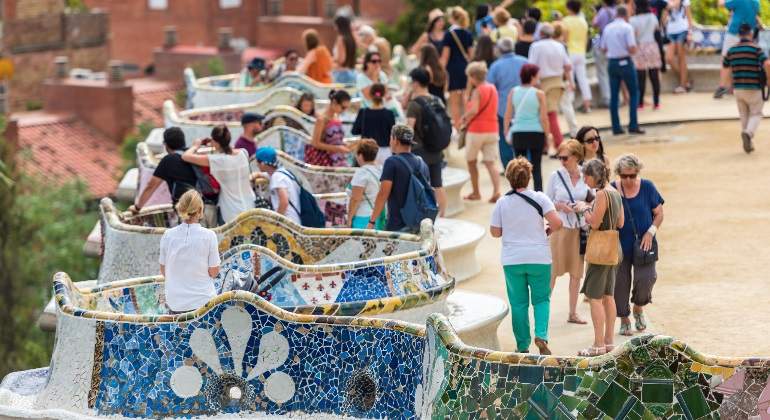The Spanish tourism sector increases its concern about the rise in infections and future and foreseeable restrictions. That is why it reiterates its demand for support measures from the Government. The good prospects of displacements by the national client now collide with negative messages from abroad and the spread of the Delta variable of the virus.
The growth in the number of infections and the demands of more and more autonomies, which are demanding containment measures, including the return to curfew (Castilla y León), the closure of nightlife (Catalonia), the recovery of the mandatory nature of the use of masks (Basque Country) or, the closing of parks and beaches at night to avoid bottles (Galicia) worries tourism and related businesses. Before this panorama,
Precisely on Wednesday 7, the Spanish Confederation of Hotels and Tourist Accommodation (Cehat) met with the minister of the sector, Reyes Maroto, and in their meeting he transferred “his concern about the absence and delay of the arrival of foreign visitors in some areas the coastline and the need to continue working on the recovery of the sector and the survival of companies.
“Although we have come a long way, we still have a long way to go and we need support to continue competing with other destinations that are not standing still to capture the low demand “, stressed Jorge Marichal, president of Cehat.
FT affirms that the rate of Covid-19 in Spain is the highest in continental Europe
Thus, the representatives of this Confederation demanded a package of measures to reverse a situation that in some cases seems of no return. In that package they include the demand for a temporary VAT reduction; the inclusion of the risk of exposure within the vaccination criteria, allowing for the work of the mutuals, the updating of the balance sheets at no cost to avoid problems of insolvency and, the extension of the mortgage measures.
In statements to the eE, and with regard to British tourism, Marichal acknowledged that the elimination of restrictions in the country as of July 19 can have positive consequences, since he does not have to quarantine and be able to receive British subjects from that date. “Of course, he stressed, we have to take into account the vaccine and the rhythm,
The English ‘enemy’
However, from England they put brakes. This Wednesday, the British newspaper Financial Times stated that “The Delta variant of Covid-19 and the increase in infections among unvaccinated young people have catapulted the rate of coronavirus in Spain to the highest in continental Europe.”
FT notes that infection rates have skyrocketed in the last week, surpassing both Portugal and Russia, going from 58 cases per 100,000 inhabitants on June 29 to 156 this Tuesday.
Following the British newspaper, Goldman Sachs indicates that the Delta variant probably implies a slightly slower reopening in countries with high vaccination.
The bank has lowered its growth forecasts in the United Kingdom, but also in Spain and Italy, “where new restrictions could weigh down the rest of summer tourism,” they warn. In their view, the high infections of the new Delta variant alone may continue to weigh on travel, consumer risk aversion and weak labor supply.
However, they insist that countries with high vaccination rates and containment strategies should experience only “a modest drag” from the impact of the Delta variant.
Health calls for early detection
In Spain, the escalation of cases in recent days continues unabated and Spain stood at over 250 cases per 100,000 inhabitants (extreme risk). The Minister of Health, Carolina Darias, after meeting with the autonomies, will not develop additional measures that allow the curfew and trust to the early detection of cases and their tracking the control of the curve. “We have made 5 million antigen tests available to communities,” said Darias. The Health strategy collides with the recommendation of its experts, who asked to study the possibility of a curfew. In addition, the minister ruled out that the measure of relaxing the use of the mask was a mistake. “Experts agree that in open spaces with a distance of one and a half meters the risk is minimal,” he said.
Meanwhile, the communities continue to decree new restrictions due to the increase in registered coronavirus cases, with Aragon being the last to announce that the entire region will close the hotel business at 11:00 p.m. In the opinion of José Luis Yzuel, president of the Hospitality Industry of Spain, the increase in these restrictions “without a doubt” does not help to improve this sector, so affected by the pandemic, now with the epidemiological addition of the Indian variant.
For now, Catalonia, the Basque Country, Andalusia and Castilla y León have asked to restore the mandatory use of the mask outdoors. In the Balearic Islands, its executive has approved an extension of the capacity limitations of bars and restaurants in order to contain the pandemic and in Cantabria, the ‘Covid traffic light’ will place 36 municipalities in Cantabria at level 2 this week, so here nightlife venues will be closed.


